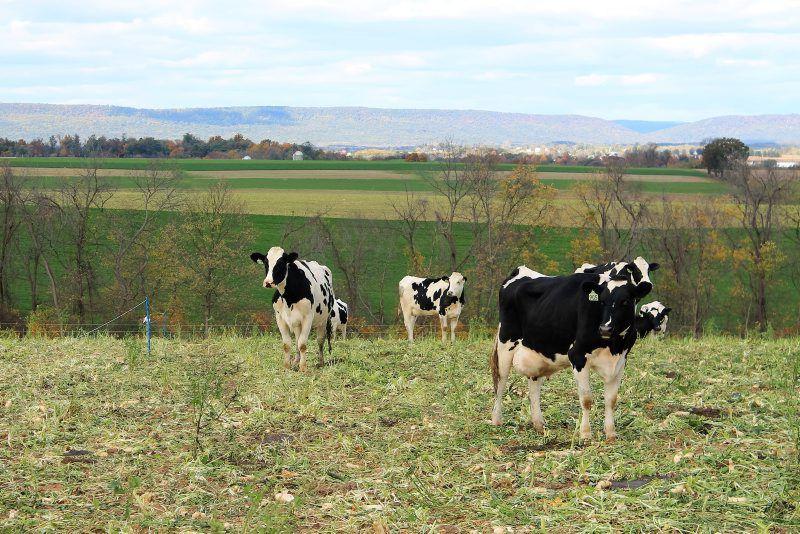
09 Feb $1M Grant Aims to Transform Dairy Landscape
Written by Tom Venesky
Originally published on Lancaster Farming on Aug. 31, 2021
A new program has lofty goals for increasing grass-based dairy farming in southeastern Pennsylvania, and it could come with big financial benefits for farmers.
Using a $1 million grant from the National Fish and Wildlife Foundation, Pasa Sustainable Agriculture aims to create the nation’s first regenerative organic dairy supply chain.
As part of that goal, Pasa aims to transition 10,000 acres on 54 dairy farms to a grazing model — converting 6,000 acres of cropland to managed grazing systems, and 4,000 acres of cropland to perennial hay.
The project will serve Dauphin, Lancaster, Lebanon and York counties.
“It’s a big goal. We’re pretty bullish on it,” said Franklin Egan, Pasa’s education director. “This is the largest grant I know of in growing the grass-based dairy model in Pennsylvania.”
The grant doesn’t open until Oct. 1, but Egan said he’s already received plenty of interest from dairy farms.
Such a transition would provide environmental benefits, Egan said, but there’s also a significant financial enticement.
At least 40 of the dairies participating in the project will be offered the opportunity for a five-year contract with Origin Milk Co., complete with an eye-popping price of $40 per hundredweight for their all-grass, organic-certified milk.
Egan said the price could go even higher in the future, but he cautioned farmers to think carefully before making the commitment.
“It’s certainly a very powerful incentive, but the output per cow is much lower in an all-grass model, so we want farmers to look at this carefully,” Egan said. “They won’t be doing this alone, and it could be an enormous benefit for them.”
The Center for Dairy Excellence and other organizations will assist the farms with financial planning, mentoring and analysis.
“The project team will work together with dairy farms transitioning to grass-fed organic milk production to make other updates on their farms that improve water quality, such as planting riparian forested buffers along streams and improving barnyards,” said John Williamson, a business developer at TeamAg, a consulting firm connected to the program.
The Rodale Institute will provide support for dairy farms to become Regenerative Organic Certified, which provides standards for soil health, animal welfare and farmworker treatment.
Ephrata National Bank can provide financing to help farms transition to grazing.
Colorado-based Mad Agriculture will provide a third-party assessment of the project.
Dairies can further benefit from the project by being able to sell value-added dairy products and take advantage of the consumer demand for grass-fed milk, Egan said.
Egan acknowledged that transitioning 10,000 acres to pasture is a tall order. The acreage to be converted per farm is larger than the average farm in the state.
But Egan argued the figure has to be high for the project to generate environmental benefits, such as improved soil health and water issues.
The project team expects to improve water quality in the Chesapeake Bay by reducing annual runoff by 400,000 pounds of nitrogen, 9,000 pounds of phosphorus and 23 million pounds of sediment.
Egan said participating farms could have opportunities to take advantage of carbon and nutrient credits as well.
“The greenhouse gas footprint of a grazing dairy is very favorable, and these types of dairies are much more resilient to the extreme weather we’re seeing across Pennsylvania,” he said. “Grass-fed cows tend to be healthier and more resilient to heat stress, so this is a more climate-ready style of dairying.”
The grant will run until October 2024, and Egan said both existing dairies and those that exited the industry but would like to start back up are eligible to apply.
In the future, he added, the grant may be extended to beef finishing operations that want to transition to grazing.
To apply for the grant, contact Pasa at 814-349-9856 or visit pasafarming.org.
“The hope is this keeps building and the grant continues after 2024,” Egan said. “We think this is a great business opportunity for farmers and it can address important climate challenges.”


No Comments